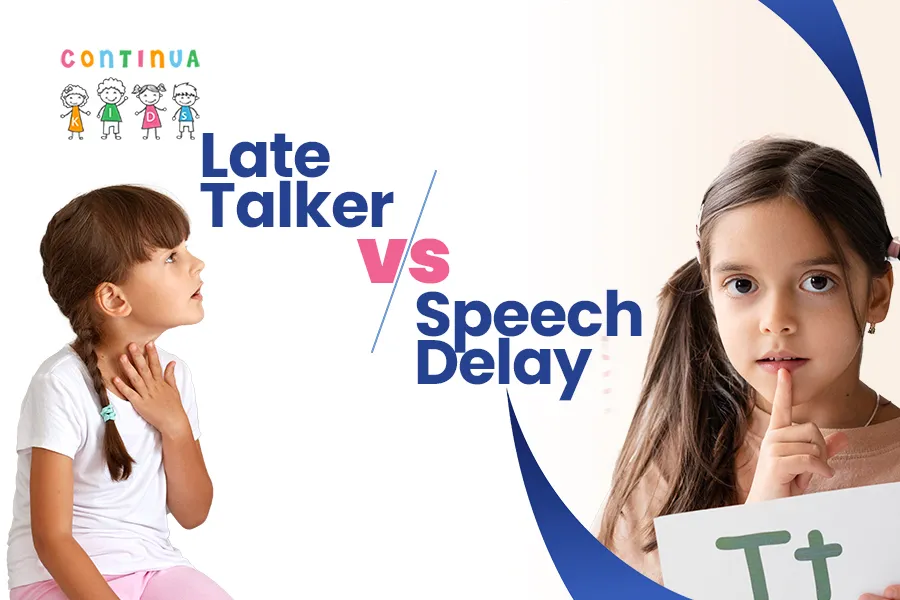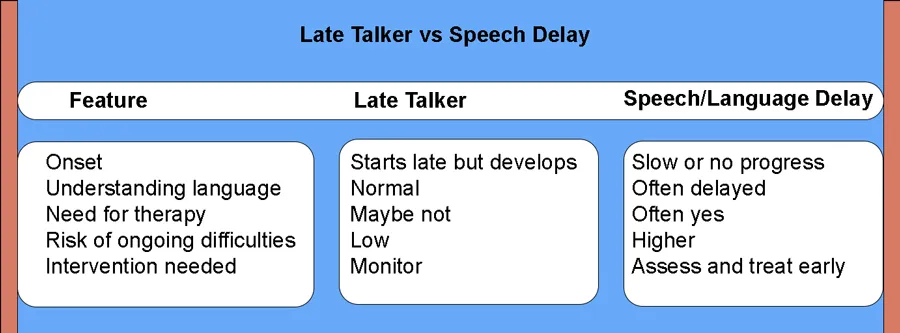
Late Talker vs Speech and Language Delay
Children grow at different paces. It happens generally when it comes to talking or speech related concerns. Some children begin to talk quite early. Some really take time to speak. But, you must be wondering if your child is simply a “late talker”? Or is it a more serious issue such as a speech or language delay?
At Continua Kids, centre for child development with a focus on early intervention. Indeed, every child grows at a different pace. But, a speech and language delay may also need treatment.
Let’s explore the difference between a late talker and a child with a speech/language delay. We will also look at what can cause speech delay, what the signs are, and the best possible way to treat speech language delay in late talker toddler.
What is a Late Talker?
Characteristics of Late Talkers:

What is Speech and Language Delay?
Speech and language delay can be defined as a child’s slow speed to achieve the typical developments in speech, comprehension, or language use.
In contrast to late talkers, these children might also have difficulties with word comprehension, sentence building or expressing their ideas. This delay is known as speech language delay, and can be treated with the right speech therapy plans. Read More
Key Differences:
| Feature | Late Talker | Speech & Language Delay |
|---|---|---|
| Understanding | Normal | May be limited |
| Social interaction | Normal | May be affected |
| Play skills | Age-appropriate | May be delayed |
| Catching up by age 3 | Often | Not always |
| May need therapy | Not always | Often recommended |
Early Signs/Symptoms of Speech Delay Every Parent Should Know
There are many causes of speech delay. And sometimes there is not an identifiable cause. But in some cases it is associated with somatic, neurological or developmental problems.
Common Causes of Speech Delay:
1. Hearing Problems
- A child who cannot hear will not learn how to speak.
- Sound and word can be affected by ear infections, fluid, or hearing loss.
- Children may not respond to their name.
- They might not react to loud noises.
- Speech may sound unclear or limited.
2. Oral-Motor Issues
- Problems with the movement of the mouth, tongue, or jaw needed for speech.
- Children may drool frequently.
- They may have trouble chewing or blowing.
- Speech may sound slurred or weak.
3. Developmental Disorders
- Seen when other conditions, such as autism spectrum disorder (ASD), Down syndrome or intellectual disability, are diagnosed.
- May have delayed milestones in multiple areas.
- Limited eye contact or social response.
- Repetitive behaviors or difficulty in learning words.
4. Neurological Problems
- Brain injuries, cerebral palsy, or genetic conditions can lead to speech delay
- Muscle weakness or coordination issues may be present.
- Speech may develop very slowly.
5. Environmental Factors
- Limited interaction with caregivers.
- Too much screen time.
- Growing up in a bilingual or multilingual environment, where people speak different languages at a same time.
Age-Wise Signs of Speech Delay in Children
Early detection is key. Parents should start talking with the child regularly, asking him/her about the day or how he/she is feeling. While communicating, note the signs if he/she is taking time to speak or to process the sentences. Read More
By Age Milestones
| Age | Red Flags |
|---|---|
| 12 months | No babbling or gestures like waving |
| 18 months | No words, doesn’t respond to names |
| 36 months | ewer than 50 words, not combining words |
| 48 months | Unclear speech, hard to understand even for family |
At-Home Speech Therapy Activities for Parents to Support Your Child
Simple Ways to Encourage Speech:
- Talk often - : Describe what you are doing, seeing, or touching.
- Read books- : Start with picture books. Let the child name what they see.
- Sing rhymes -: Nursery rhymes like “twinkle twinkle”, “baa baa Black sheep”, and teach new words.
- Play together - : Use toys, pretend play, and role play.
- Give time to respond - : Don’t rush the child. Wait for them to speak.
Does Your Child Need Speech Therapy? Know What to Expect
- Hearing and oral health
- Developmental milestones
- Play and social skills
- Speech and language abilities
- VB-MAPP (Verbal Behavior Milestones Assessment and Placement Program)
- ABLLS-R (Assessment of Basic Language and Learning Skills)
- Language sampling and observation
What Happens in Speech Therapy?
- By using play-based learning, therapists work with the children.
- They model correct speech and give chances to repeat sounds or words.
- Visuals, gestures, and activities may be used to improve understanding.
- Parents and therapist counselling sessions are Organized on how to support communication at home.
Therapy is usually short and regular, for example 30–45 minutes, 2–3 times a week. It may go on for several months depending on progress.
Late Talker vs Speech Delay
| Feature | Late Talker | Speech/Language Delay |
|---|---|---|
| Onset | Starts late but develops | Slow or no progress |
| Understanding language | Normal | Often delayed |
| Need for therapy | Maybe not | Often yes |
| Risk of ongoing difficulties | Low | Higher |
| Intervention needed | Monitor | Assess and treat early |
How Is Speech Delay Diagnosed?
Steps in Diagnosis
1. Developmental History
- Questions about pregnancy, birth, and early milestones
- Family history of delays or disorders
2. Hearing Assessment
- Rule out hearing loss as a cause
- Conducted using audiometry or ENT consultation
3. Speech-Language Evaluation
- Done by a certified Speech Language Pathologist (SLP)
- Tests involve Receptive-Expressive Emergent Language Scale (REEL) or Preschool Language Scale (PLS)
4. Observation and Play Assessment
- Evaluates how the child interacts, follows directions, or uses gestures
What Happens If Speech Delay Is Left Untreated?
Potential Long-Term Effects
1. Academic struggles
- Difficulty with reading, writing, and spelling
- Trouble following instructions in school
2. Social challenges
- Difficulty making friends
- Frustration in group settings
3. Emotional impact
- Low self-esteem
- Withdrawal or behavioural problems
4. Delayed overall development
- Cognitive delays
- Limited ability to express thoughts clearly
Conclusion
Not every child talks at the same time. Some can be slower than others. If your child is struggling to meet speech milestones or find it difficult to do so, ask for help.
Continua Kids offers a nurturing, clinical environment with expert speech therapists, pediatricians, and psychologists working together as one team to achieve desired results.
FAQs
- Speech is how we say words (sounds, voice).
- Language is how we use words to share ideas (vocabulary, grammar, understanding).
